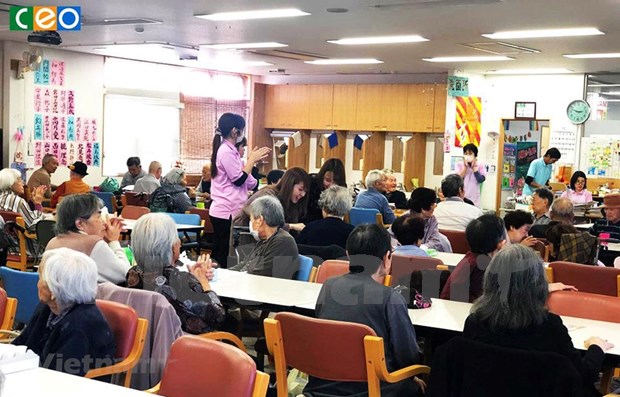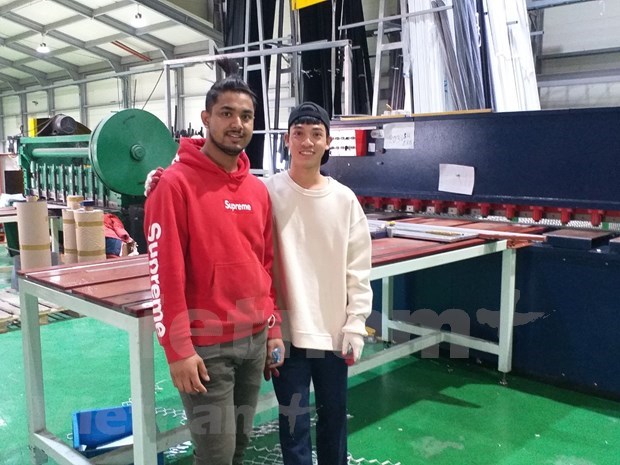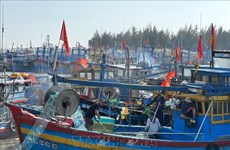Working abroad offers life-changing opportunities for Vietnamese workers
 Vietnamese workers at an elderly nursing home in Japan (Photo: VietnamPlus)
Vietnamese workers at an elderly nursing home in Japan (Photo: VietnamPlus)
Hanoi (VNA) – Sending Vietnamese labourers to work abroad is among important and efficient channels in job creation, which helps raise income for workers.
Sending Vietnamese abroad is a consistent, important and long-term policy of the Government, contributing to job creation, hunger eradication and poverty reduction, as well as human resources training for national building in the industrialisation and modernisation process.
Protection for overseas Vietnamese workers holds significant meaning for smooth operation the activities in compliance with the law. Especially in the context of the COVID-19 pandemic, foreign labour markets pose higher risks than ever.
With a target of working abroad to improve his income, after graduating from the Hanoi College of Technology and Economics, in early 2019, Phan Bao Quoc, residing in Binh Luc of northern Ha Nam province, qualified to working for Daewoo Solution, which specilises in making anti-insect nets in the Republic of Korea (RoK).
“After months in the RoK, I can pay for all of my expenses and send money monthly to support my family. My job does not require overtime, so I only receive base salary. Even so, it is comfortable and not dangerous,” he said.
 Phan Bao Quoc (R) poses for a photo with a foreign colleague (Photo: VietnamPlus)
Phan Bao Quoc (R) poses for a photo with a foreign colleague (Photo: VietnamPlus)Sending Vietnamese labourers to work abroad is among important and efficient channels in job creation.
Statistics of the Department of Overseas Labour (DOLAB) at the Ministry of Labour, Invalids and Social Affairs (MoLISA) showed that in the recent five years until 2019, the number of migrant Vietnamese workers has been on the rise, increasing by roughly 10,000 people each year.
In addition to job creation, labourers’ income significantly improves, standing at about 1,500 USD in Japan and 1,800 USD in the RoK.
Migrant workers have an important role to play for the national economic development via remittances. According to estimates of the Government, the figure hit around 3 billion USD annually.
DOLAB Director Tong Hai Nam said most of Vietnamese labourers are working at the three traditional markets of Japan, the RoK and Taiwan (China), which offer suitable jobs and stable income.
Upon their return to the homeland, many workers full of experience and language skills were able to find high-paid jobs.
Companies sending Vietnamese workers overseas have taken the initiative in seeking new markets and paid heed to preparations, aiming to improve workers’ professional and language skills, along with general knowledge.
It was previously estimated that in 2020, some 130,000 Vietnamese are working overseas.
The COVID-19 pandemic, however, has delivered a major blow to many countries and territories in the region and the world, including traditional markets receiving Vietnam’s migrant workers. Various firms had to restructure, cut down the number of migrant workers or cancel request to send more workers abroad.
As a result, as of September 20, only close to 43,000 workers had been sent abroad, primarily during the first three months of the year, when COVID-19 had yet to break out.
Nam said that when the first cases of the disease were reported in some countries and regions in February, DOLAB issued guidelines for and called on migrant workers to follow regulations and guidance of their employers and local authorities in disease prevention.
In addition, it set up information channels and points of contact in respective locations and regions to stay in touch with and keep a close watch on health conditions of labourers, in a bid to take timely action.
The department also partnered with relevant agencies, foreign partners, and employers to ensure fundamental rights and interests in salary, working conditions and daily activities of workers under signed contracts, in case of reduction of working hours and temporary leave due to the impacts of COVID-19.
Of note, DOLAB had requested the MoLISA to work with the Ministry of Foreign Affairs, the Ministry of Transport and relevant agencies on the arrangement of repatriation flights bringing Vietnamese workers home.
Safety of workers is currently a priority of companies sending workers abroad.
As of early September, more than 3,000 migrant workers had been brought home./.












